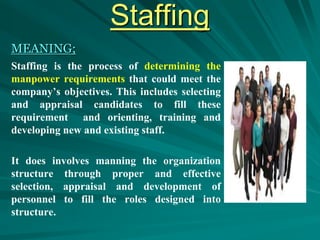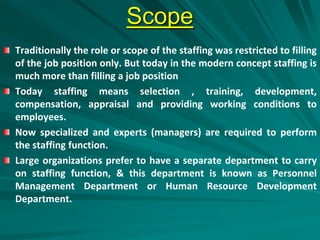Staffing; Definition, Scope, Need, Significance, Process.
- 2. Staffing MEANING; Staffing is the process of determining the manpower requirements that could meet the company’s objectives. This includes selecting and appraisal candidates to fill these requirement and orienting, training and developing new and existing staff. It does involves manning the organization structure through proper and effective selection, appraisal and development of personnel to fill the roles designed into structure.
- 3. “The managerial function of staffing involves manning the organizational structure through proper & effective selection, appraisal & development of personnel to fill the roles designed into the structure ---- Koontz O’ Donnel The Staffing function of management pertains to recruitment, selection,training,development,appraisal and remuneration. Personnel management or staffing is that phase of the management which deals with the effective control and use of manpower or human resources.” ---- Dale Yoder
- 4. Scope Traditionally the role or scope of the staffing was restricted to filling of the job position only. But today in the modern concept staffing is much more than filling a job position Today staffing means selection , training, development, compensation, appraisal and providing working conditions to employees. Now specialized and experts (managers) are required to perform the staffing function. Large organizations prefer to have a separate department to carry on staffing function, & this department is known as Personnel Management Department or Human Resource Development Department.
- 5. Need or Benefits 1. Filling the roles or injecting life in organization This function is needed to fill the roles & job positions created by the organizational structure. There will be no use of job positions unless & until these are occupied by employees & staffing function appoints these employees to fill the roles or job positions. 2. Human emphasis This is the only function which more emphasis to the human element such as attitude, sincerity, loyalty, team-sprit, positive approach etc. while selecting, appraising & developing the employees. 3. Key to effectiveness of other functions As all the functions are performed by human beings and human beings joins the organization by staffing only.
- 6. 4. Helps in competing Two organizations can acquire the same type of physical and financial resources but what helps the one to win over other is its competent staff. The organization with efficient staff can easily win over its competitor. 5. Effective use of technology & other resources The efficient use of the resources can be made by efficient staff only & efficient staff comes in a organization as a result of staffing function only. 6. Boosts up the morale of the employees. Staffing function does not comes to an end only with appointment of employees. It includes training, promotion, compensation etc. All these activities help in motivating the employees & increasing their morale.
- 7. 7) Availability of knowledge The research program is conducted to find out different methods of recruitment, selection & training of employees. Looking at the availability of the knowledge in staffing function, there is definitely need for it in the organization. 8) Specialization Today the staffing function is not the routine job of all the managers but the specialized & professionally expert managers are given this task by creating separate department in the organization.
- 8. Importance of Staffing It helps in discovering talented & competent workers & developing them to move up the corporate ladder. It insures greater production by putting right man to right job. It avoids a sudden disruption of an enterprise’s production run by indicating shortages of personnel, if any, in advance. It help to prevent under-utilisation of personnel through over manning & the resultant high labour cost & low profit margins. it provides information to management for internal succession of managerial personnel in the event of an unanticipated turnover.
- 9. Importance It is considered of so much importance due to following functions. 1. Investment cost 2. Holistic approach; 3. Long term effect 4. Potential contribution or consideration 5. Investment may surpass the cost 6. Multiplier effect;
- 10. Staffing as a part of human resource Management Specialized & professional experts are appointed to perform the staffing function. The experts are grouped in human resource management department & it enables increase in the scope of staffing. The human resource management has to perform some activities which are man power planning, selection, recruitment, deciding the compensation, training & identification of skilled employees for promotions, appraising the performance, etc. Due to legal obligations also organisations cannot consider labour as any other physical commodity, which is bought, used, exploited, & discarded. Human being once appointed must get good working conditions , humanly treatment & must be trained whenever there is need for it. In present situation of competition an organisation can win only if it has good & effective human resource because rest other resources can be of same nature but human efficiency always differ.
- 11. Staffing process Man Power Planning Job Analysis Recruitment Selection Placement & Orientation Training Performance Appraisal Promotion & Career Planning Compensation Separation
- 12. Staffing Process 1) Manpower planning: Human resource planning is a forward looking function as it tries to access in advance the manpower requirement of the organisation.These managers try to find out number of employees needed in the organization. 2) Job Analysis: It means careful study of each job along with the responsibilities involved in it .The main components of or main elements of job analysis are. Task & responsibilities involved in it. Conditions under which job has to be performed. Relation of one job with another job. Qualifications of the individuals who have to perform to job.. The main focus of the job analysis is on placing right person at right place.
- 13. 3) Recruitment; It can be defined as inducing or attracting more & more candidates to apply for the job in the organisation. If it is successful then organisation will get a large number of applications & better choice can be made. Recruitment can be made inside the organisation as well as from outside the organisation depending on the nature of vacancy . The outcome or the result of this function is to receive a large number of applications.
- 14. 4) Selection; It means choosing the most appropriate & best suitable candidates to perform the job. The selection process has various elements; Preliminary interview. Written test. Final interview. Medical Examination etc. 5) Placement & Orientation Placement refers to asking the selected candidate to occupy vacant job position in the organisation. In placement employees are assigned a role or designation in the organisation which they have to perform efficiently. Orientation means introduction of new employees with the existing employees of the organisation.
- 15. 6) Training It means equipping the new employee with the knowledge & skill needed to perform the assigned to that employee. It is a very imp. to get work done in the expected manner to have uniformity & to improve the efficiency level of performance. 7) Performance appraisal After training program the employees are given the jobs to be performed. While they are performing, they are supervised & observed & by their superiors to determine how successfully the employees are meeting the demands of their job. The superior prepare the performance appraisal reports periodically for all the employees on the basis of which the future training programs are set. & their compensation is decided. 8) Promotion & career Planning when the employees are doing well & their performance appraisal report is excellent then they are rewarded by assignment of higher job position which is called promotion.
- 16. 9) Compensation It means to match the salary with the contribution of the employees. This is done by keeping government regulations, financial capacity of the company & the compensation offered by the competitors. It also includes the increments & other incentives which are offered to the employees for extra contribution. 10) Separation. The organisation loses its employees or gets separated from its employees due to termination, retirement, or resignation of employees.
Editor's Notes
- Investment cost This function requires huge investment because in performing activities related to staffing function huge amount of money is spent. For e.g., in recruitment huge amount is invested in advertisement, in selection also large amount is spent in arranging interviews, in training & development. The organization is spending is spending huge amount in updating the knowledge of employees. This investment cost vary with the quality of human resource we are getting. Holistic approach; It is important to choose persons with caution as their usefulness depends on the manager under whom they are working & facilities available to them & person/s who assist him. Thus efficiency of work will depend on the person, his boss & his assistants which will contribute to a holistic approach towards effective management. Long term effect The investment in human resources is of long term effect. This makes the decision to employ and remove a person from employment the most important consideration. Potential contribution or consideration Since staffing is a long-term investment, so while performing staffing function the managers don’t in mind only the present requirement of the organization but they also keep future requirement of the organization. While selecting a person they keep in mind that he can contribute presently and what are his potentials for future. Investment may surpass the cost Cost of material resources used in any business enterprise cannot be negative. This means loss may be up to the cost of such raw materials but this is not so in case of money invested in human resources. The return on the investment of personnel, more particularly managerial personnel, may be positive or negative. Multiplier effect; It means that total effect of individual performance by every member gets multiplied when they start working as a team. The team efforts are much more than the total of individual efforts because by working together due to cooperation their efforts get multiplied.















